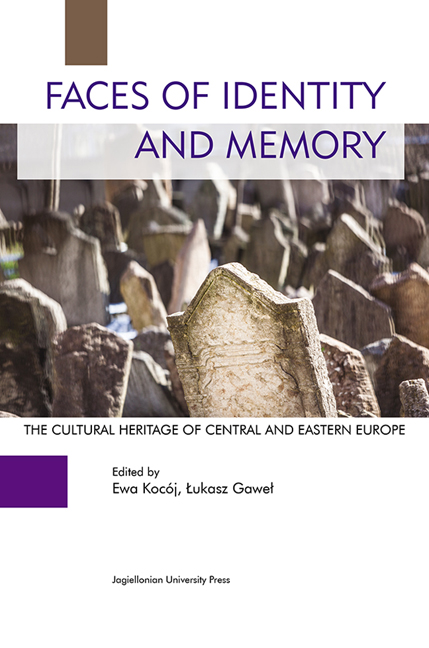 Faces of Identity and Memory
Faces of Identity and Memory Book contents
- Frontmatter
- Contents
- Introduction
- Memory and Identity. Monuments of Romanian Tangible Culture Inscribed on the UNESCO World Heritage List (a Short Presentation)
- Inventorisation and Recording of Sacral Art Objects in Lithuania in 1995–2005
- National lieux de mémoire and the European Heritage Label. Some Reflections on the Case of the Gdańsk Shipyard
- Porrajmos. Constructing Gypsy Holocaust Memory in the Recent Cinema
- The Vacuum and the Imagination of Space. The Cultural Role of the Żyznowski Publishing House
- Cultural Animation as the Art of Remembering. The Activities of the “Borderland of Arts, Cultures and Nations” Centre in Sejny
- ‘The Painted Village’ – Zalipie as an Expression of Ethnographic Tourism in the Powiśle Dąbrowskie Region of Poland
- 20th Century Theatrical Heritage: The Escape from Illusion
- Protection of Cultural Heritage. The Case of Krakow
- Managing an Artist's Legacy on the Example of Foundation for Support of Modjeska's Life and Art Research in Kraków
- Culinary Heritage as Used in the Present. Selected Elements of the Culinary Heritage Management in Contemporary Poland
20th Century Theatrical Heritage: The Escape from Illusion
Published online by Cambridge University Press: 10 January 2018
- Frontmatter
- Contents
- Introduction
- Memory and Identity. Monuments of Romanian Tangible Culture Inscribed on the UNESCO World Heritage List (a Short Presentation)
- Inventorisation and Recording of Sacral Art Objects in Lithuania in 1995–2005
- National lieux de mémoire and the European Heritage Label. Some Reflections on the Case of the Gdańsk Shipyard
- Porrajmos. Constructing Gypsy Holocaust Memory in the Recent Cinema
- The Vacuum and the Imagination of Space. The Cultural Role of the Żyznowski Publishing House
- Cultural Animation as the Art of Remembering. The Activities of the “Borderland of Arts, Cultures and Nations” Centre in Sejny
- ‘The Painted Village’ – Zalipie as an Expression of Ethnographic Tourism in the Powiśle Dąbrowskie Region of Poland
- 20th Century Theatrical Heritage: The Escape from Illusion
- Protection of Cultural Heritage. The Case of Krakow
- Managing an Artist's Legacy on the Example of Foundation for Support of Modjeska's Life and Art Research in Kraków
- Culinary Heritage as Used in the Present. Selected Elements of the Culinary Heritage Management in Contemporary Poland
Summary
Abstract: In this article the author refers to the escape of illusion in the contemporary theatre as a result of the destruction of the Italian stage historical conventions in the series of the “theatrical revolutions” of the 20th century. The “anti-illusionist theatre models” of the greatest stage artists at the end of 20th century, Robert Wilson, Tadeusz Kantor and Peter Brook, are discussed as the examples of the post-modernist crisis in theatrical representation connected with the logocentric domination of the word and faith in the rational order of things. The 20th century “anti-illusionist” theatrical heritage is based not only on significant changes in the language and acknowledged conventions as well as styles, but mainly on the idea of a non-mimetic space of a liberated performance demonstrating “visual musicality” from the “intercultural” perspective.
Key words: anti-illusion, post-modern theatre, theatrical heritage, Tadeusz Kantor, Peter Brook, Robert Wilson
The post-modernist shift in culture (and ideology) over the last decades has resulted from the need to reject all models that “falsify” reality (born on the Italian stage from the spatial perception of the world). In return, we have been offered the transformation of the static space into a process, and have seen it given a temporal dimension (mutability, motion, etc.). This is different from the “spatialization” of time that could be identified as the essence of modernism.
Constructing spatial models, the modernistic theories of the theatre have attempted to reduce live performances, with their excess of significance and impurity, to the purity and unambiguity of the “machines for the production of significance.” Post-modern anthropologists of the theatre have aimed at concentrating on whatever diverges from all rules, knocks down divisions and schemas, destroys pre-theatrical attitudes and all presuppositions… and thus everything that is the definition of performance as described by Chomsky (in reference to language), especially in a theatre that is fated to a game of chance.
Against the Italian stage, “modernist” theatrology has invented the super- arbiter, a competent structuralist, semiologist and phenomenologist placed in the audience with all his apparatus for seizing and freezing the significances in a polymorphic, multivariant spectacle.
- Type
- Chapter
- Information
- Faces of Identity and MemoryThe Cultural Heritage of Central and Eastern Europe (Managing and Case Studies), pp. 141 - 150Publisher: Jagiellonian University PressPrint publication year: 2015


